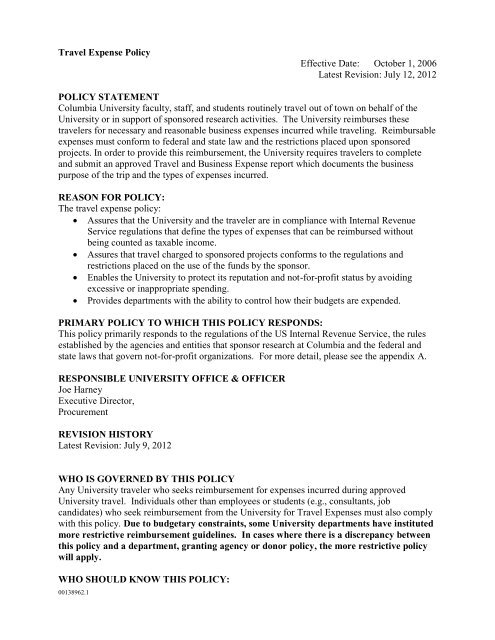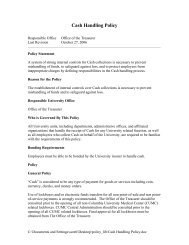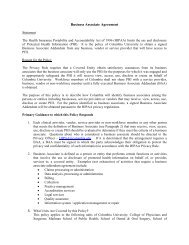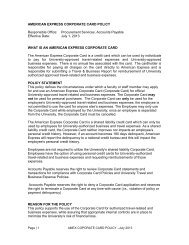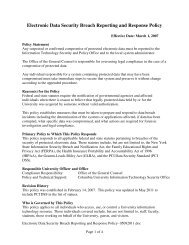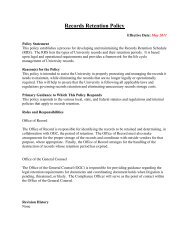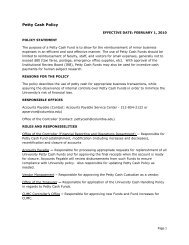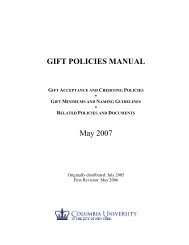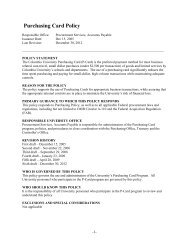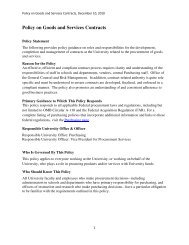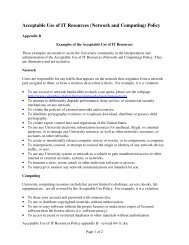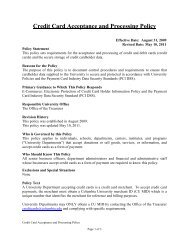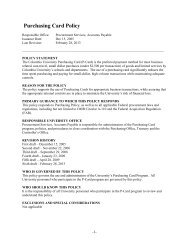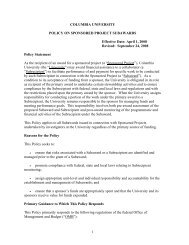Travel Expense Policy Effective Date - Columbia University ...
Travel Expense Policy Effective Date - Columbia University ...
Travel Expense Policy Effective Date - Columbia University ...
Create successful ePaper yourself
Turn your PDF publications into a flip-book with our unique Google optimized e-Paper software.
<strong>Travel</strong> <strong>Expense</strong> <strong>Policy</strong><br />
00138962.1<br />
<strong>Effective</strong> <strong>Date</strong>: October 1, 2006<br />
Latest Revision: July 12, 2012<br />
POLICY STATEMENT<br />
<strong>Columbia</strong> <strong>University</strong> faculty, staff, and students routinely travel out of town on behalf of the<br />
<strong>University</strong> or in support of sponsored research activities. The <strong>University</strong> reimburses these<br />
travelers for necessary and reasonable business expenses incurred while traveling. Reimbursable<br />
expenses must conform to federal and state law and the restrictions placed upon sponsored<br />
projects. In order to provide this reimbursement, the <strong>University</strong> requires travelers to complete<br />
and submit an approved <strong>Travel</strong> and Business <strong>Expense</strong> report which documents the business<br />
purpose of the trip and the types of expenses incurred.<br />
REASON FOR POLICY:<br />
The travel expense policy:<br />
� Assures that the <strong>University</strong> and the traveler are in compliance with Internal Revenue<br />
Service regulations that define the types of expenses that can be reimbursed without<br />
being counted as taxable income.<br />
� Assures that travel charged to sponsored projects conforms to the regulations and<br />
restrictions placed on the use of the funds by the sponsor.<br />
� Enables the <strong>University</strong> to protect its reputation and not-for-profit status by avoiding<br />
excessive or inappropriate spending.<br />
� Provides departments with the ability to control how their budgets are expended.<br />
PRIMARY POLICY TO WHICH THIS POLICY RESPONDS:<br />
This policy primarily responds to the regulations of the US Internal Revenue Service, the rules<br />
established by the agencies and entities that sponsor research at <strong>Columbia</strong> and the federal and<br />
state laws that govern not-for-profit organizations. For more detail, please see the appendix A.<br />
RESPONSIBLE UNIVERSITY OFFICE & OFFICER<br />
Joe Harney<br />
Executive Director,<br />
Procurement<br />
REVISION HISTORY<br />
Latest Revision: July 9, 2012<br />
WHO IS GOVERNED BY THIS POLICY<br />
Any <strong>University</strong> traveler who seeks reimbursement for expenses incurred during approved<br />
<strong>University</strong> travel. Individuals other than employees or students (e.g., consultants, job<br />
candidates) who seek reimbursement from the <strong>University</strong> for <strong>Travel</strong> <strong>Expense</strong>s must also comply<br />
with this policy. Due to budgetary constraints, some <strong>University</strong> departments have instituted<br />
more restrictive reimbursement guidelines. In cases where there is a discrepancy between<br />
this policy and a department, granting agency or donor policy, the more restrictive policy<br />
will apply.<br />
WHO SHOULD KNOW THIS POLICY:
The employee or student requesting reimbursement for business travel should know this policy<br />
along with:<br />
� Senior Executive Officers, Provost<br />
� Deans<br />
� Senior Financial or Business Officers<br />
� Chairs of Departments, Directors of Institutes and Centers<br />
� Department Administrators<br />
� Divisional Administrators with financial responsibility and oversight<br />
� Program Directors<br />
� Principal Investigators<br />
� Faculty<br />
� Students<br />
� Post-doctoral fellows<br />
� Graduate research assistants<br />
� Junior Officers and Non-Officers with financial responsibility and oversight<br />
� Administrative staff with significant travel responsibility<br />
EXCLUSIONS & SPECIAL SITUATIONS<br />
This policy covers <strong>University</strong> out of town business travel. It does not cover local transportation<br />
(taxis to meetings or other <strong>University</strong> campuses and offices in the NYC area) and miscellaneous<br />
business expenses. These types of expenses are addressed in the policy on Business <strong>Expense</strong>s.<br />
This policy is designed to address the majority of expenses that a traveler may incur. On rare<br />
occasions, a traveler may incur an extraordinary expense for which they believe they are entitled<br />
to reimbursement. In cases where a traveler believes that they are entitled for reimbursement for<br />
an expense that is not addressed by the current policy or not allowed under current policy they<br />
may request an exception. Exception requests should be infrequent and require the approval of a<br />
Dean, Vice President, Associate Dean, or Senior Financial Officer. See the procedures for<br />
detailed instructions for requesting an exception.<br />
00138962.1<br />
2
POLICY TEXT<br />
Many members of the <strong>University</strong>’s faculty, staff and students must travel out of town on<br />
<strong>University</strong> business. This includes travel to conferences, travel to meet with firms or individuals<br />
doing business with the <strong>University</strong> and travel to perform research. In such cases, the <strong>University</strong><br />
will reimburse the traveler for necessary and reasonable expenses incurred while traveling.<br />
<strong>Travel</strong> should be booked at the lowest possible cost and with as much advance notice as possible.<br />
The remainder of this section guides the traveler as to the kinds of expenses that may be<br />
reimbursed.<br />
Due to budgetary constraints, some <strong>University</strong> departments have instituted more restrictive<br />
reimbursement guidelines. In cases where there is a discrepancy between this policy and a<br />
department, granting agency or donor policy, the more restrictive policy will apply.<br />
To read more about the process of filing an expense reimbursement, please go here.<br />
The roles for expense reimbursement include:<br />
The <strong>Travel</strong>er<br />
The individual incurring the travel expense must be familiar with Departmental policies and this<br />
<strong>University</strong> policy in order to ensure compliance and prudent spending of <strong>University</strong> funds.<br />
<strong>Travel</strong>ers whose expenses will be charged to a sponsored project must also be familiar with the<br />
particular expense restrictions of that project. The traveler is also responsible for obtaining all<br />
proper documentation for each expense. Typically, this documentation will be a receipt that<br />
identifies the expense and reflects proof of payment of the expense. Specific information<br />
regarding acceptable form of expense documentation is noted throughout this policy. The<br />
traveler is also responsible for documenting the business purpose or justification for each<br />
expense. This helps to document why the expense is eligible for reimbursement and should not<br />
be considered as taxable income.<br />
The traveler should request reimbursement within 10 business days of the trip and must request<br />
reimbursement no later than 120 days after date of the expenditure or the end of the <strong>University</strong>’s<br />
fiscal year, whichever is sooner. Late submissions may only be reimbursed with the approval of<br />
the department. Supporting documentation must be provided in order to describe the<br />
circumstances leading to the late submission in order to evaluate whether it is a taxable event. If<br />
the circumstances described would not have prevented the traveler from submitting within the<br />
proper timeframe (120 days), they are considered taxable income. <strong>Expense</strong> reimbursements<br />
requested more than one year from the date of expenditure are always considered taxable income<br />
to the traveler.<br />
The traveler is responsible for completing the <strong>Travel</strong> and Business <strong>Expense</strong> report in accordance<br />
with <strong>University</strong> policy and procedure. If an individual other than the traveler prepares the <strong>Travel</strong><br />
and Business <strong>Expense</strong> report, the traveler is responsible for providing the preparer with the<br />
appropriate information to complete the form and reviewing the completed form for the accuracy<br />
00138962.1<br />
3
of all information. The traveler must sign the <strong>Travel</strong> and Business <strong>Expense</strong> form and retain a<br />
copy for their records.<br />
To receive direct deposit of reimbursement payments, the employee should submit the<br />
online form available at<br />
https://wwwa.ais.columbia.edu/apr/dirdep_applic/dirdep_start.php.<br />
Administrative Processor<br />
In some departments, an individual may prepare expense reports on behalf of other employees in<br />
their area and/or enter these into ARC, the system used to process Accounts Payable<br />
transactions. In these instances, the processor is responsible for confirming:<br />
� Understanding of the nature of each expenditure and the business purpose for <strong>University</strong><br />
reimbursement<br />
� Completeness of documentation and accuracy of accounting<br />
� Completeness and accuracy of the required information on the expense report form<br />
� Allocation and segregation of expenses to the appropriate <strong>University</strong> account(s) and/or<br />
project.<br />
<strong>Travel</strong> Approver<br />
The <strong>Travel</strong> Approver should be an Officer who is sufficiently senior within the organization to<br />
have the authority to approve travel advances and expense reimbursements for faculty and staff<br />
in the School/Admin Unit.<br />
� Responsible and accountable for the <strong>Travel</strong> Business and <strong>Expense</strong> Report (TBER) and<br />
<strong>Travel</strong> Advance vouchers that he/she approves, certifying through approval that the travel<br />
is:<br />
o appropriate<br />
o valid<br />
o policy compliant<br />
o within budget<br />
� A <strong>Travel</strong> Approver must, under his/her own authority, be able to independently determine<br />
policy compliance; however, a <strong>Travel</strong> Approver may, as part of his/her own approval<br />
process, require the signature of a traveler’s supervisor or other officer on the TBER or<br />
Advance Request form to certify the appropriateness, validity and funding of the travel<br />
All requests for reimbursement must be approved by an individual with “<strong>Travel</strong> Approver<br />
Authority” for his or her department(s). The approver's electronic signature in ARC certifies that<br />
the expenditures are approved expenses that comply with <strong>University</strong> policy and that they<br />
represent appropriate use of departmental or grant funds.<br />
Regardless of the travel approver’s authority, under no circumstances may an individual<br />
approve his or her own report or that of a person to whom he or she reports. Deans and<br />
00138962.1<br />
4
V.P.s must have their reports signed by the appropriate approver (president, provost, senior<br />
executive V.P., executive V.P. for finance).<br />
<strong>Expense</strong> Report Validator<br />
The <strong>Expense</strong> Report Validator must also sign the <strong>Travel</strong> and Business <strong>Expense</strong> Report to certify<br />
that the travel is valid, appropriate, and policy compliant. The <strong>Expense</strong> Report Validator should<br />
be the traveler’s supervisor, or other appropriately senior person in the department. The <strong>Expense</strong><br />
Report Validator can also be the ARC <strong>Travel</strong> Approver and in these cases, it is not necessary for<br />
the TBER form to be signed by the <strong>Expense</strong> Report Validator; only the approval in ARC by the<br />
<strong>Travel</strong> Approver is required. In cases where the <strong>Expense</strong> Report Validator is not the <strong>Travel</strong><br />
Approver, the <strong>Expense</strong> Report Validator should be familiar enough with the expense activity to<br />
validate it, as the ARC <strong>Travel</strong> Approver will be relying on the validation of the <strong>Expense</strong> Report<br />
Validator as part of the voucher approval process in ARC.<br />
Supplemental Approver (Dean, VP, Associate Dean, Senior Financial Officer)<br />
Certain circumstances require the approval of a Dean, VP, Associate Dean or Senior Financial<br />
Officer. Those situations under this <strong>Travel</strong> <strong>Expense</strong> policy include expenses for:<br />
� First or business class travel by air (flights in excess of 5 hours or medical need).<br />
� First or business class travel by rail/bus (not including Amtrak's Acela train).<br />
� Lodging greater than $350 per night domestic and $400 (US dollars) per night<br />
international by no more than 50%.<br />
� Appreciation given for lodging in a private residence.<br />
� Short-term rental accommodations.<br />
� Reimbursed travel extended beyond the minimum days required for business purposes.<br />
� Required travel by an employee's spouse, significant other and/or dependent. (Note: may<br />
be taxable)<br />
� Meals exceeding the per meal thresholds ($25 breakfast, $35 lunch, $50 dinner) by no<br />
more than 50%.<br />
� Meals (fundraising, recruitment, speaking engagements) involving external parties<br />
exceeding the per person threshold of $100 (excluding tips and taxes) by no more than<br />
50%.<br />
� Meals (fundraising, recruitment, speaking engagements) involving external parties<br />
exceeding the per person threshold of $100 (excluding tips and taxes) by no more than<br />
50%<br />
� Use of per diems on non-grant accounts. . (Only in instances of international travel to<br />
destinations where local custom or culture makes it difficult to obtain receipts).<br />
00138962.1<br />
5
� Meals that require attendance by an employee's spouse, significant other, and/or<br />
dependent.<br />
� Purchase of emergency supplies/equipment in excess of $500.<br />
� Issuance of a second travel advance before the first one has been reconciled<br />
� Reimbursements submitted more than 120 days after the date of the expense or after the<br />
end of the fiscal year (whichever is sooner).<br />
� Missing receipt for expenses of $75 or more ($25 for meals), all lodging.<br />
Accounts Payable<br />
Accounts Payable will process all approved expense reports and prepare and issue the payment<br />
to the employee. Accounts Payable also images, files and archives all original documentation<br />
related to the reimbursement request. Accounts Payable will perform audits of these expense<br />
reports.<br />
Accounts Payable will assist employees, processors, and approvers with policy and procedure<br />
questions.<br />
Requests for exception or adjustment to policy will be reviewed by Accounts Payable and<br />
approval or denial will be communicated to the department.<br />
00138962.1<br />
6
Key Compliance Matters<br />
The IRS and Federal regulations require certain standards to be met when documenting,<br />
recording and submitting reimbursable expenses. These include:<br />
� Submitting expenses for reimbursement within a reasonable time limit<br />
� Documenting the specific business purpose of an expense<br />
� Providing receipts and proof of payment<br />
� Segregating unallowable or excessive expenses<br />
Reimbursement Submission Time Limit<br />
The IRS requires travel expense reimbursements to be reported within a reasonable period of<br />
time. The determination of a reasonable period of time will depend upon the facts and<br />
circumstances, but is generally held to be no later than 120 days after the date of the expense. In<br />
addition, in order to adhere to generally accepted accounting principles, the traveler should be<br />
mindful of the <strong>University</strong>’s June 30 th fiscal year end, and all expenses for that year should be<br />
reported prior to year end to ensure that the expense is appropriately captured in the financial<br />
statements and in the department’s budget for the appropriate fiscal period. <strong>Expense</strong><br />
reimbursements should be submitted to the department within 10 business days after<br />
return from the trip. Reimbursement requests must be submitted no later than 120 days<br />
after the date of the expense, or the end of the fiscal year whichever is sooner. Late<br />
submissions may only be reimbursed with the approval of the department.<br />
Reimbursements submitted more than 120 days after the date of the expense or at the end<br />
of the fiscal year (whichever is sooner) require Supplemental Approval. Please note that<br />
supporting documentation must be provided in order to describe the circumstances leading to the<br />
late submission in order to evaluate whether this is a taxable event. If the circumstances<br />
described would not have prevented the traveler from submitting within the proper timeframe,<br />
they are considered taxable income to the traveler. <strong>Expense</strong> reimbursements submitted after one<br />
year requires an exception request and are always considered taxable income to the traveler and<br />
will be reported on their annual Form W-2.<br />
Business Purpose<br />
All expenses must be for a valid business purpose that is necessary and reasonable in order to conduct<br />
<strong>University</strong> business. A business purpose must be documented for all expenditures for which a traveler is<br />
requesting reimbursement.<br />
Business purpose must be specific. “<strong>Travel</strong> to Boston, MA to speak at Accounts Payable Network<br />
conference” is an appropriately documented business purpose. “<strong>Travel</strong> to Boston for conference” is not.<br />
The business purpose of an expense may be obvious to the traveler, but not to a third-party<br />
reviewer.<br />
Receipts<br />
The traveler is expected to obtain original receipts for all expenses for which they plan to have<br />
reimbursed. An original receipt may take many forms (i.e. cash register receipt, copy of an order<br />
form, web receipt or confirmation). A receipt must identify:<br />
� the date of purchase<br />
� the vendor name<br />
� itemized list and unit price of the purchased items<br />
� the total amount<br />
00138962.1<br />
7
If the traveler is unable to obtain an original receipt that contains all the required information,<br />
documentation should be submitted to demonstrate as many of the required items as possible. A<br />
copy of the traveler’s credit or debit card statement identifying the date, location and amount of<br />
the expense, or a rental agreement, may be submitted along with a description of the purchase,<br />
identifying the amount of any expenses to be segregated (i.e. alcohol).<br />
Complete documentation must be received for all expenses of $75 or more ($25 for meals) and<br />
all lodging. If documentation of an expense of $75 or more ($25 for meals) and all lodging is not<br />
available, the traveler may submit a written description of the item purchased, noting the date,<br />
the location, and the amount. Any request for reimbursement documented in this way requires<br />
Supplemental Approval and the missing receipt worksheet must also be completed and submitted<br />
to Accounts Payable.<br />
A receipt in a foreign language is considered acceptable documentation, with the US Dollar<br />
conversion amount noted on the receipt (if currency conversion worksheet is not used).<br />
Responsibility lies with the department to certify that it is appropriate business expenditure and<br />
that the conversion rate is appropriate and to document the business purpose.<br />
Proof of Payment<br />
The traveler is expected to obtain proof of payment for all expenses for which they plan to have<br />
reimbursed. Proof of payment may take many forms but must demonstrate that payment was<br />
tendered and must identify the means by which payment was tendered by the traveler. This is<br />
often part of the original receipt. Examples of this may include notation of:<br />
� “Cash Tendered”<br />
� “Paid”<br />
� A zero balance due<br />
� Debit/Credit card payment (card type, last four digits of card and/or signature)<br />
If no proof of payment is available in this form, a debit or credit card statement may also be<br />
provided. Please black out any private or unrelated information.<br />
Segregated Costs<br />
The Federal Government will not reimburse certain expenses, termed “unallowables” and has<br />
set forth guidelines prohibiting these costs from being charged to Federal grants and<br />
contracts, either directly or indirectly. These include expenditures for alcohol, entertainment,<br />
flowers or gifts or excessive costs, such as first or business class travel and lodging or meals<br />
over the designated <strong>University</strong> thresholds. To make sure that the <strong>University</strong> does not<br />
inadvertently charge any of these expenses to grants and contracts, “unallowable” expenses<br />
have been assigned to the appropriate account.<br />
The terms “unallowable” or “segregated” do not mean that the expenses are not<br />
reimbursable, rather that they must be charged to a segregated account.<br />
Arranging for <strong>Travel</strong><br />
It is suggested that a traveler make arrangements for travel through either a <strong>University</strong>designated<br />
travel agency or a <strong>University</strong> preferred vendor. There are numerous advantages to<br />
using a <strong>University</strong> preferred agency. These agencies are aware of <strong>University</strong> travel policies and<br />
reimbursement guidelines and will help select air carriers and hotels that conform to the policy,<br />
which speeds up reimbursement. Furthermore, these agencies often have access to discounts and<br />
00138962.1<br />
8
preferential rates negotiated by the <strong>University</strong>. Finally, the agencies can help access and<br />
maintain the appropriate documentation of expenses. All travel agencies charge a per transaction<br />
service fee for ticket issuance.<br />
If traveling to a group meeting or conference, inform the <strong>University</strong>-designated travel agency<br />
about any available discount air and hotel rates offered by the conference or association meeting.<br />
If the travel agency is restricted from booking at the special discount rate, the agent will inform<br />
the traveler how to make the booking.<br />
<strong>Travel</strong>ers may elect to use a travel agency outside of the preferred list of <strong>University</strong> agencies.<br />
The <strong>University</strong> will reimburse the traveler for any agency fees provided those fees are<br />
substantiated on an original receipt from the agency. When booking a trip through a non-<br />
<strong>University</strong> preferred agency, the traveler must take responsibility for selecting arrangements that<br />
comply with <strong>University</strong> policy and spending guidelines.<br />
<strong>Travel</strong>ers are also encouraged to make travel arrangements directly with the supplier via the<br />
Internet to obtain low rates.<br />
Tax-Exempt Status<br />
The <strong>University</strong> is a tax-exempt organization and individuals should request that tax not be<br />
collected. Unfortunately, the travel industry (e.g., airlines, rail, hotel, car rental, etc.) frequently<br />
will not recognize this status and insist that taxes be paid. In these instances, the employee will<br />
be reimbursed for the taxes paid. If the supplier requests a tax-exemption certificate, it can be<br />
obtained from Accounts Payable.<br />
Air <strong>Travel</strong><br />
Economy/coach class airline tickets should be purchased aboard a regularly scheduled<br />
commercial carrier. While some restrictions or penalties may apply, reservations made 14 days<br />
or more in advance of the trip secure the lowest fares. For all travel (except for travel on a<br />
government grant):<br />
� Carrier selection should be influenced by price (and not by the traveler’s frequent flyer<br />
affiliation or other personal considerations)<br />
� <strong>Travel</strong> on a US air carrier is preferred, but not required<br />
Please visit the Purchase Office web site at: http://finance.columbia.edu/procurement/purchasing<br />
for further information on available <strong>University</strong>-wide Purchasing Agreements (UwPA) for air<br />
travel.<br />
Government sponsored grants require the traveler to fly on a US owned airline (Fly America<br />
Act). The US Flag Carrier <strong>Policy</strong> is available on the Research Administration website at<br />
http://www.columbia.edu/cu/opg/policies/usflag.pdf. Exceptions to this requirement are listed in<br />
the policy. Please note the specific rules regarding code sharing in the Flag Carrier <strong>Policy</strong>, as<br />
they are restrictive and must meet specific criteria to qualify. If travel is charged to a<br />
governmental grant and a foreign carrier is used, the department or traveler may provide any of<br />
the following types of documentation to demonstrate it is allowable:<br />
� documentation of the US Flag Carrier policy exception that was met<br />
00138962.1<br />
9
� a copy of the section of the grant award/budget that allows foreign air carriers<br />
� written approval from the department’s Research Administration project officer<br />
authorizing the expenditure<br />
First or Business Class <strong>Travel</strong><br />
The <strong>University</strong> expects that the majority of air travel will be at the lowest available fare. In<br />
addition, the majority of <strong>University</strong> research grants only allow for travel in coach or economy<br />
class. <strong>Travel</strong>ers may travel in business class as an exception (or first class if business class<br />
service is not offered on the flight) only if:<br />
� the flight has a scheduled in air flying time in excess of five hours.<br />
� a documented medical condition requires it.<br />
The traveler must obtain Supplemental Approval for the use of first or business class to obtain<br />
approval of the exception request. First or business class airfare can only be charged to a<br />
government grant in cases where the grant explicitly allows such expenses. In all cases, the<br />
amount above economy fare must be segregated to an appropriate ARC account. The cost of the<br />
lowest available airfare should be obtained by the traveler at time of purchase.<br />
If a traveler elects to fly in business or first class on a flight of less than five hours duration or if<br />
they fail to obtain Supplemental Approval, they will be reimbursed only for an amount<br />
equivalent to a coach airfare. The cost of the lowest available airfare should be obtained by the<br />
traveler at time of purchase.<br />
Other Air <strong>Travel</strong><br />
<strong>Travel</strong> by non-commercial means (i.e. corporate jets, helicopter) is not allowed.<br />
Receipts Required for Air <strong>Travel</strong><br />
The original passenger ticket/receipt, boarding pass, e-ticket or website statement or<br />
confirmation, or itinerary issued by a travel agent, must include:<br />
� the dates and points of departure and arrival<br />
� the travel “class” (unless there is only one class on the airline, like Jet Blue)<br />
� the total amount of the flight<br />
� proof of payment<br />
A traveler can be reimbursed in advance of a flight for an airline ticket. To seek reimbursement<br />
prior to travel, the traveler must purchase the ticket at least 14 days prior to an approved trip and<br />
submit proof of payment, a copy of the ticket or itinerary, along with the valid business reason.<br />
The “travel end” date on the <strong>Travel</strong> and Business <strong>Expense</strong> report should reflect the return date of<br />
the trip.<br />
00138962.1<br />
10
Rail/Bus <strong>Travel</strong><br />
Rail or Bus tickets should be purchased at the lowest available commercial/economy rate. For<br />
travel by rail, the <strong>University</strong> maintains a contract with Amtrak with rates available to travelers<br />
through the <strong>University</strong>’s preferred travel agencies. Details of this program can be accessed at<br />
http://www.campustravel.com/university/columbia/. <strong>Travel</strong>ers should use Amtrak’s unreserved<br />
or reserved coach class of service. If traveling by Amtrak’s “Acela Express” train, a traveler<br />
should obtain business class tickets, as this is the lowest class of travel.<br />
The <strong>University</strong> expects that tickets are purchased at the lowest available fare. If under rare<br />
circumstances, a higher class of service is used, the traveler must obtain Supplemental<br />
Approval. First or business class fare can only be charged to a government grant in cases where<br />
the grant explicitly allows such expenses. In all cases, the amount above economy fare must be<br />
segregated to the appropriate ARC account.<br />
Be aware that the <strong>University</strong> will reimburse the cost of fare not to exceed the cost of the lowest<br />
available commercial airfare.<br />
Documentation required<br />
The original ticket, ticket stub or receipt for fares must include:<br />
� the dates and points of departure and arrival<br />
� the class<br />
� total amount of the fare<br />
� proof of payment<br />
Ground Transportation<br />
While traveling, it may be necessary to use multiple modes of ground travel. These include<br />
rental cars, taxis, private car services or personal vehicles. In all cases, the traveler should<br />
exercise reasonable judgment and either use a <strong>University</strong> preferred supplier or choose the most<br />
economical ground travel option available.<br />
Rental Cars<br />
Rent vehicles only when less expensive comparable transportation is unavailable. When<br />
available, use the <strong>University</strong> preferred car rental agency, Hertz,<br />
(http://www.campustravel.com/university/columbia/).<br />
Reimbursement for car rentals may be for compact or intermediate/mid-size classifications for<br />
individual travelers. All authorized drivers must be listed on the car rental contract at the time of<br />
rental. Reimbursement will be made for larger vehicles in exceptional cases (i.e., several<br />
travelers in one car, equipment being transported, etc.), which must be documented. <strong>Travel</strong>ers<br />
may be reimbursed for gas purchases for rental cars.<br />
When using the <strong>University</strong> preferred car rental agency in the Continental US, do not purchase<br />
Loss Damage Waiver (LDW) and/or Liability insurance from the car rental agency, as the<br />
00138962.1<br />
11
<strong>University</strong> has negotiated a separate agreement with the agency. <strong>Travel</strong>ers will not be<br />
reimbursed for this expense if renting from the designated <strong>University</strong> rental agency. If renting<br />
from the designated <strong>University</strong> rental agency in an international location only, the Loss Damage<br />
Waiver and Liability insurance can be purchased.<br />
If the <strong>University</strong> preferred car rental agency is not available, other car rental agencies may be<br />
used. Loss Damage Waiver and Liability insurance MUST be purchased when renting from<br />
these agencies both internationally and domestically. In such cases, the <strong>University</strong>’s auto policy<br />
WILL NOT cover damages ASSOCIATED WITH RENTED VEHICLES.<br />
<strong>Expense</strong>s for GPS (Global Positioning Mapping) devices when renting a vehicle are<br />
reimbursable with prior approval from your DAF.<br />
Documentation Required<br />
The traveler must obtain and submit an original receipt from the car rental agency that includes:<br />
00138962.1<br />
� the dates and points of rental<br />
� the class<br />
� total amount of the rental<br />
� proof of payment<br />
If a car is rented above the compact or intermediate/mid-size car rate, document the business<br />
purpose that required the additional car space.<br />
<strong>Travel</strong> by Private Vehicle<br />
When traveling for business purposes, a personal vehicle may be used in order to save time,<br />
transport equipment, reduce costs when several people are traveling together, or travel to<br />
locations within reasonable driving distance. If a personal vehicle is used primarily for the<br />
convenience of the traveler and the approved travel is to a location more than 500 miles beyond<br />
the point of origin, reimbursement will not exceed the lesser of the following: 1) the cost of permile<br />
reimbursement plus tolls; or, 2) the round-trip airfare between the nearest commercial<br />
airport serving the origin and destination cities, plus transfer costs to and from the airport.<br />
For the business-related use of a personal vehicle, the traveler will be reimbursed at a rate based<br />
on the Federal IRS approved highway mileage guides. Mileage reimbursement covers fuel,<br />
maintenance/repairs, insurance, transportation and operating costs, so these will not be<br />
reimbursed separately. The traveler will not be reimbursed for the cost of vehicle purchase or<br />
lease.<br />
In addition to the mileage allowance, tolls and necessary parking charges may be reimbursed.<br />
The <strong>University</strong> does not assume liability for damage to personal automobiles used on <strong>University</strong><br />
business and does not assume liability for deductibles or any other uninsured loss to the vehicle.<br />
<strong>Expense</strong>s for vehicle repairs are not reimbursable. Under no circumstances will the <strong>University</strong><br />
reimburse parking fines and moving violations on personal vehicles.<br />
12
Personal Vehicle Mileage Rate for <strong>Travel</strong>:<br />
00138962.1<br />
� $.405/mile for travel on or after February 1, 2005<br />
� $.485/miles for travel on or after September 12, 2005<br />
� $.445/miles for travel on or after January 1, 2006<br />
� $.485/miles for travel on or after January 1, 2007<br />
� $.505/miles for travel on or after January 1, 2008 until July 1, 2008<br />
� $.585/miles for travel on or after July 1, 2008<br />
� $.550/miles for travel on or after January 1, 2009<br />
� $.500/miles for travel on or after January 1, 2010<br />
� $.510/miles for travel on or after January 1, 2011<br />
� $.510/miles for travel on after January 1, 2011 until July 1 2011<br />
� $.555/miles for travel on or after July 1, 2011<br />
Documentation Required<br />
<strong>Travel</strong>ers should keep a record (e.g., spreadsheet, notebook or ledger; AAA triptic or mapquest<br />
printout) of their use of their private vehicle for business travel. The written record should<br />
include:<br />
� the dates and points (City, State) of departure and arrival<br />
� business purpose of the trip<br />
� total mileage<br />
� calculation of reimbursement (total mileage * mileage rate)<br />
Other Forms of Ground Transportation<br />
<strong>Travel</strong>ers will be reimbursed for bus, subway, or other mass transportation, shuttle, taxi fares, or<br />
private car service plus reasonable tips when necessary for business purposes. Reimbursement<br />
will be provided for transportation between hotels, railroad stations, airports, restaurants,<br />
workplaces or meetings.<br />
Documentation required<br />
<strong>Travel</strong>ers should attempt to obtain a receipt from the driver or transportation company. The<br />
original receipts for fares must include:<br />
� the dates and points of origin and destination<br />
� passengers names<br />
� the total amount of the fare<br />
� proof of payment<br />
If it is not possible to obtain a receipt for ground transportation, the traveler should list the trip in<br />
a spreadsheet, notebook or ledger. The traveler should record the date of the trip, the points of<br />
origin and destination, the business purpose of the trip and the fare paid.<br />
13
Lodging<br />
The <strong>University</strong> will reimburse travelers for the cost of their rooms and any applicable taxes and<br />
fees when traveling on approved <strong>University</strong> business. When possible, the <strong>University</strong>’s preferred<br />
hotel properties should be utilized and can be viewed at<br />
http://www.campustravel.com/university/columbia/.<br />
The cost of a hotel stay in the US should not exceed $350 per night (excluding taxes).<br />
International travelers should obtain room rates that do not exceed $400 per night (US dollars,<br />
excluding taxes). Lodging costs in excess of $350 per night in the US and $400 per night in an<br />
International location (by no more than 50%) requires Supplemental Approval. All policy<br />
exceptions not listed as eligible for Supplemental Approval, or any requests for exception of<br />
amounts that exceed the thresholds allowable for Supplemental Approval, still require a formal<br />
written exception request approved by a Senior Departmental Officer for documentation and<br />
evaluation by Accounts Payable.<br />
If a conference is held in a hotel where the rate exceeds these amounts, please attach the<br />
conference flyer identifying the location of the conference and the offered hotel<br />
accommodations.<br />
In rare cases (i.e., a peak travel season, special event at a location), a traveler may be required to<br />
obtain a room whose costs exceed the guidelines. In these instances, the traveler must first<br />
obtain the approval of their Dean, VP, Associate Dean or Senior Financial Officer and obtain<br />
approval of the reimbursement request. Lodging costs in excess of $350 per night in the US and<br />
$400 per night in an International location (by no more than 50%) requires Supplemental<br />
Approval. All policy exceptions not listed as eligible for Supplemental Approval, or any<br />
requests for exception of amounts that exceed the thresholds allowable for Supplemental<br />
Approval, still require a formal written exception request approved by a Senior Departmental<br />
Officer for documentation and evaluation by Accounts Payable. The traveler should document<br />
the business reason for exceeding the guideline. The cost of a hotel above this amount can only<br />
be charged to a government grant in cases where the grant explicitly allows such expenses. In all<br />
cases, the amount above the threshold must be segregated to the appropriate ARC account.<br />
Documentation Required<br />
The traveler must submit an original itemized hotel bill that must include:<br />
� the dates of departure and arrival<br />
� the detailed charges<br />
� the total amount of the lodging<br />
� proof of payment<br />
Lodging in a Private Residence<br />
<strong>Travel</strong>ers who stay in a private residence with relatives or friends while traveling on business<br />
may be reimbursed for reasonable expenses incurred extending appreciation to hosts for their<br />
hospitality. This may include a small gift to the host or payment for meals, and should not<br />
00138962.1<br />
14
exceed $100. However, the traveler must first obtain the approval of their Dean, VP, Associate<br />
Dean or Senior Financial Officer and obtain their approval of the exception request. This<br />
circumstance requires Supplemental Approval from the department.<br />
Documentation Required<br />
The original itemized receipts and proof of payment for any expenses incurred extending<br />
appreciation.<br />
Rental Accommodations<br />
Depending on the length of stay, it may be economical for the traveler to stay in a rental<br />
accommodation. However, the traveler must first obtain the approval of their DAF and obtain<br />
their approval of the reimbursement request.<br />
Documentation Required<br />
The traveler must submit an original itemized rental bill or agreement that must include:<br />
� the dates of stay<br />
� the detailed charges<br />
� the total amount of the lodging<br />
� proof of payment (zero balance folio)<br />
Meeting and Conference Fees<br />
Meeting or Conference fees will be reimbursed by the <strong>University</strong>. It is preferable that either a Pcard<br />
is used or the <strong>University</strong> is billed directly for these expenses. However, if the traveler pays<br />
the registration fee, they will be reimbursed.<br />
Documentation Required<br />
In order to receive reimbursement for a conference fee, the traveler must submit a flyer or other<br />
literature describing the conference, a registration form, agenda or original receipt for the<br />
conference fees. The documentation must include:<br />
� the dates and location of the conference<br />
� the total amount of the conference fees<br />
� proof of payment<br />
A traveler can be reimbursed in advance for conference fees paid. To seek reimbursement prior<br />
to travel, the traveler must submit proof of payment and a copy of the conference flyer or<br />
registration, along with the valid business reason. The “travel end” date on the <strong>Travel</strong> and<br />
Business <strong>Expense</strong> report should reflect the return date of the trip.<br />
00138962.1<br />
15
Airline Baggage Charges (Baggage Fee)<br />
When traveling by air, airlines may charge for a first or second checked bag. The <strong>University</strong> will<br />
reimburse that charge if the bag is needed on a business trip, or when traveling with heavy or<br />
bulky materials or equipment that is required for business.<br />
If the trip includes business and pleasure and the bag is used for pleasure (golf clubs, skis, etc),<br />
the extra charge is not reimbursable.<br />
Miscellaneous <strong>Travel</strong> <strong>Expense</strong>s<br />
In the course of travel, a traveler may incur additional expenses eligible for reimbursement.<br />
These include:<br />
� Baggage handling and storage expenses<br />
� Business office expenses (copy services, postage, etc.)<br />
� Business-related phone calls (including cell phone), faxes, internet connectivity,<br />
including those necessary to obtain transportation and hotel reservations<br />
� Up to 3 personal calls per day of reasonable duration<br />
� Currency conversion, ATM and traveler’s check fees<br />
� Excess baggage fee due to the size or weight of an item being transported at the request<br />
of the <strong>University</strong><br />
� Reasonable and usual gratuities to porters, bellhops and other service personnel<br />
� Internet access<br />
� Laundry or cleaning expenses on trips lasting over five (5) days, unless emergency<br />
circumstances are documented<br />
A list of non-reimbursable expenses can be found in the Appendix B.<br />
Documentation Required<br />
Where appropriate, travelers should obtain and submit the original or cash register receipts for<br />
miscellaneous expenses. The receipt must include:<br />
� the date<br />
� the items purchased or services provided<br />
� the total amount<br />
� proof of payment<br />
Combination packages<br />
00138962.1<br />
16
In order to save money, some travelers may consider booking a package (airfare, hotel, car<br />
rental) on a discount website such as Expedia, Orbitz or Priceline. Policies relating to airfare,<br />
hotel, and car rental continue to apply. <strong>University</strong> designated travel agencies may also provide<br />
package deals and additional traveler support for changes and cancellations.<br />
Extending <strong>Travel</strong> beyond the Minimum Days Required<br />
The <strong>University</strong> will typically not reimburse the cost of lodging, local transportation, meals or<br />
other costs in excess of the minimum days necessary for travel or conference attendance. The<br />
traveler must first obtain Supplemental Approval and obtain approval of the exception request.<br />
A detailed business purpose must also be provided in conjunction with supplemental approval<br />
for extended travel beyond the minimum days required.<br />
If the traveler and/or employee does not have a legitimate business purpose for general expenses<br />
(not including air or rail fare) incurred for their extended stay, reimbursement will not be granted<br />
for travel exceeding the minimum days required for business purposes.<br />
Documentation Required<br />
If general expenses related to an earlier departure and/or later return are being reimbursed, please<br />
provide the specific business purpose for the extended stay. All documentation requirements for<br />
the specific expenditure type apply.<br />
Extending <strong>Travel</strong> beyond the Minimum Days Required (air or rail fare)<br />
The costs related to an earlier departure and/or later return for airfare or rail fare may be reimbursed<br />
when the total cost of the airfare or rail fare is clearly documented and demonstrated to be equal to or<br />
lower than it would have been for the dates required for business travel.<br />
Documentation Required<br />
If air or rail expenses related to an earlier departure and/or later return are being reimbursed, the<br />
total cost of airfare or rail fare should be compared to the costs for traveling on the dates required<br />
for business travel. Documentation should include a price quote from either the air carrier and/ or<br />
rail carrier for the dates that would have been used if the travel was not extended. All<br />
documentation requirements for the specific expenditure type apply.<br />
Use of Frequent <strong>Travel</strong>er Awards for <strong>Travel</strong><br />
<strong>Travel</strong>ers will not be reimbursed for airline tickets purchased, partially purchased or<br />
accommodations and upgrades obtained using frequent flyer miles.<br />
<strong>Expense</strong>s to Change or Cancel <strong>Travel</strong> Plans<br />
The <strong>University</strong> will reimburse the costs of travel purchased (i.e. airfare, deposits) or surcharges<br />
imposed due to cancellations or changes in travel arrangements only when required for business<br />
needs.<br />
00138962.1<br />
17
Meals<br />
The <strong>University</strong> reimburses employees for meals during travel on <strong>University</strong> business.<br />
Business Meals<br />
Business Meals are reimbursed on an actual basis and include:<br />
� The cost of breakfast, lunch or dinner eaten by an individual traveler while away from the<br />
<strong>University</strong> on approved business travel.<br />
� Reasonable and necessary meal expenses for business meetings involving only <strong>University</strong><br />
personnel and students during which focused business discussions take place. The<br />
frequency of such meetings and the related expenses must be reasonable and appropriate<br />
to the purpose of the discussion and the nature of the business conducted. Such meetings<br />
include:<br />
00138962.1<br />
o Breakfast, lunch and dinner meetings which are necessary to conduct of<br />
<strong>University</strong> business.<br />
o Formally organized meetings which are necessary to carry out the business of<br />
official committees appointed by the <strong>University</strong>, School or Department.<br />
o Meetings on an organized work group of employees or students that require the<br />
work of the group to progress through normal meal time.<br />
� Reasonable and necessary meal expenses for peer groups for research collaboration or<br />
administrative meetings during which focused business discussions take place.<br />
Except under rare circumstances, these meals should not exceed the following thresholds,<br />
excluding tips and tax:<br />
� Up to $25 for breakfast,<br />
� Up to $35 for lunch,<br />
� Up to $50 for dinner<br />
Any meal costs in excess of the per meal threshold (by no more than 50%) require Supplemental<br />
Approval. All policy exceptions not listed as eligible for Supplemental Approval, or any<br />
requests for exception of amounts that exceed the thresholds allowable for Supplemental<br />
Approval, still require a formal written exception request approved by a Senior Departmental<br />
Officer for documentation and evaluation by Accounts Payable. In all cases, the amount above<br />
the threshold must be segregated to the appropriate ARC account.<br />
These thresholds are not per diems, and should not be charged as such. <strong>Travel</strong>ers must<br />
submit individual receipts showing the actual cost of each meal.<br />
Business meals hosted by CU involving external parties<br />
The <strong>University</strong> will pay for approved, necessary and reasonable business meal expenditures that<br />
are hosted by and paid for by a CU employee and include guests, business colleagues, donors,<br />
and prospective employees which results in a business benefit to the <strong>University</strong>. Examples<br />
18
include fundraising, recruitment, and recognition of a speaker. These may occur either locally or<br />
during out of town travel.<br />
Any meal costs in excess of the per meal threshold (by no more than 50%) require Supplemental<br />
Approval. All policy exceptions not listed as eligible for Supplemental Approval, or any<br />
requests for exception of amounts that exceed the thresholds allowable for Supplemental<br />
Approval, still require a formal written exception request approved by a Senior Departmental<br />
Officer for documentation and evaluation by Accounts Payable. In all cases, the amount above<br />
the threshold must be segregated to the appropriate ARC account.<br />
The cost of alcoholic beverages consumed during a meal may be reimbursed. However, the cost<br />
may not be charged to a sponsored project and must be charged to a segregated ARC account. In<br />
addition, reimbursements for business meals that meet the following criteria require segregation<br />
to the appropriate ARC account:<br />
� Reimbursements for business meals that require attendance by an employee’s spouse,<br />
significant other, and/or dependent require Supplemental Approval.<br />
� <strong>Expense</strong>s for business meals conducted in private homes will only be paid when<br />
Supplemental Approval is provided.<br />
Documentation Required<br />
The original restaurant or cash register receipts for business meals must be obtained and<br />
submitted with the employee’s expense report. The receipt must include:<br />
� the date and location<br />
� the type of meal (breakfast, lunch, dinner)<br />
� the meal items purchased (identify alcohol)<br />
� the total amount of the meal<br />
� proof of payment<br />
The cost of alcoholic beverages may not be charged to a sponsored research account and must be<br />
segregated to the appropriate ARC account.<br />
A list of attendees (or a number, if there are more than 10 names), the relationship to the<br />
<strong>University</strong>, and the business purpose of the meal must also be clearly documented.<br />
Use of Per Diems for Meals<br />
The use of a per diem should be rare. Per diems may only be used for instances of international<br />
travel to destinations where local custom or culture makes it difficult to obtain receipts.<br />
<strong>Travel</strong>ers must receive prior approval to use per diems from their Dean, VP, Associate Dean or<br />
Senior Financial Officer.<br />
If a per diem is to be claimed, the traveler must select per diems for the duration of the trip (i.e.<br />
can not alternate between per diem and actual receipts). The per diem must be claimed in<br />
accordance with the government’s published per diem rate for M&IE found at:<br />
00138962.1<br />
19
http://www.state.gov/m/a/als/prdm/71822.htm. If per diems are claimed, the traveler must print<br />
out the location and per diem rate from the governments published per diem rates as<br />
documentation. If a per diem reimbursement rate exceeds the federal rate, the excess amount<br />
over the federal rate is taxable to the traveler.<br />
In cases where per diems are allowable for travel under the terms of a grant, the department or<br />
traveler may provide any of the following forms of documentation:<br />
� a copy of the section of the grant award/budget demonstrating that it allows per diems, or<br />
written approval from the granting agency<br />
� written approval from the departments’ Research Administration project officer<br />
authorizing the expenditure<br />
Reimbursement for <strong>Travel</strong> <strong>Expense</strong>s of Spouses, Significant Others and Dependents<br />
The <strong>University</strong> will not reimburse transportation, lodging and meal expenses for a traveler’s<br />
spouse, significant other, or dependent. Reimbursement may only be allowed in limited<br />
circumstances when the travel by the spouse, significant other or dependent is:<br />
� Required by the <strong>University</strong> for a specific business event or meeting and is pre-approved<br />
by a Dean, VP, Associate Dean or Senior Financial Officer<br />
� Related to “R&R (Rest & Recuperation)” travel allowable under the terms of a sponsored<br />
project<br />
� In both circumstances, Supplemental Approval must be provided by the department<br />
Departments that choose to reimburse spousal, significant other, and/or dependent travel without<br />
a legitimate business purpose should inform the traveler that the reimbursement for the non<br />
employee travel will be taxable income to the employee and will be reported to the IRS.<br />
Documentation Required<br />
In addition to the necessary receipts, the following business purpose must be explicitly<br />
documented:<br />
� If required by the <strong>University</strong> for a specific business event or meeting, the detailed<br />
explanation of this requirement should be provided and signed by a Dean, VP, Associate<br />
Dean or Senior Financial Officer. This should be segregated to the appropriate ARC<br />
account.<br />
� If “R&R” travel is allowable under the terms of a sponsored project, provide a copy of<br />
the section of the grant award/budget demonstrating that allows R&R or a written<br />
approval from the departments Research Administration project officer authorizing the<br />
expenditure<br />
� In both circumstances, Supplemental Approval must be provided by the department.<br />
Employee Recruitment <strong>Travel</strong><br />
<strong>Travel</strong> for prospective employees and their families must be authorized by the school or<br />
department in order to be reimbursed. Reimbursements for authorized travel expenses such as<br />
00138962.1<br />
20
airfare, hotel, and meals incurred during the recruitment process are not taxable to the<br />
prospective employee.<br />
Once an offer of employment has been accepted, departments and schools should refer to the<br />
Relocation and Moving <strong>Expense</strong>s section of the Business <strong>Expense</strong> policy.<br />
Emergency Purchases of Supplies/Equipment during <strong>Travel</strong><br />
The <strong>University</strong> requires that travelers use the proper designated purchasing path to purchase<br />
supplies and equipment. A traveler may occasionally have to incur expenses for an emergency<br />
purchase of supplies or equipment. The traveler will be reimbursed for these emergency<br />
expenditures under $500. Expenditures in excess of $500 will not be reimbursed unless the<br />
traveler obtains Supplemental Approval. Expenditures in excess of $2500 that ordinarily require<br />
a Purchase Order will not be reimbursed without approval from Purchasing.<br />
Although the <strong>University</strong> is exempt from sales tax, if taxes are paid on an emergency purchase<br />
during travel, the traveler will be reimbursed. Where possible, the traveler should request tax<br />
exemption.<br />
<strong>Travel</strong> Accident Insurance<br />
The <strong>University</strong>'s Business <strong>Travel</strong> Accident Insurance policy provides coverage for all active, full<br />
time employees and graduate and teaching assistants. Employees covered by a collective<br />
bargaining agreement are excluded from coverage, unless the agreement specifically provides for<br />
coverage under this policy. Supplemental insurance is not necessary and will not be reimbursed.<br />
Coverage is provided on a 24 hour basis while traveling on a business trip, away from the<br />
employee's place of regular assignment. Commuting to and from work is excluded from<br />
coverage.<br />
Full time employees are provided coverage while on paid leave only while doing research under<br />
a project financed by another institution. Faculty members of the <strong>University</strong> are provided<br />
coverage while on sabbatical provided such arrangements have been made by the Provost's<br />
Office. Coverage during the summer vacation is excluded unless the individual is receiving<br />
additional compensation from the <strong>University</strong> during that time or the travel is paid by the<br />
<strong>University</strong>. Coverage is also excluded if the individual is employed by another institution while<br />
on sabbatical.<br />
Coverage is further subject to the terms and conditions of the <strong>University</strong>'s insurance contract.<br />
Specific details on insurance coverage are available through the Risk Management Department.<br />
Reimbursement of Individuals Other than Employees and Students for <strong>Travel</strong><br />
A department may choose to reimburse an individual other than employees and students for<br />
travel, including:<br />
� Prospective employment interviewees<br />
� Lecturers, Guest Speakers and other official visitors<br />
� Consultants<br />
00138962.1<br />
21
These individuals must be informed of the <strong>University</strong>’s travel policies in advance of their<br />
travel. Expenditures that do not comply will not be reimbursed and are not advanced prior to the<br />
trip. These expenses must be supported by documentation, as they are subject to 1099 reporting<br />
if not supported, and are reimbursed through a check request.<br />
For non-US citizens, a copy of Form I-94 or the passport page with the visa entry stamp must be<br />
provided prior to reimbursement. The <strong>University</strong> must ensure the individual is eligible to be<br />
reimbursed based on the visa type, in accordance with the chart at:<br />
http://www.columbia.edu/cu/isso/faculty/paymentchart.html.<br />
If the department is reserving hotel accommodations for the visitor using a local hotel property,<br />
the individual should identify themselves as being with the <strong>University</strong> or by providing the<br />
identification number. A list of local hotel properties is available on the Purchasing Office web<br />
site at http://finance.columbia.edu/procurement/purchasing.<br />
Documentation Required<br />
The department should document the business purpose for which the individual’s travel is being<br />
reimbursed. Reimbursement requests must be accompanied by a copy of the I-94 or passport<br />
page with the visa entry stamp, a listing of each expenditure by expense type (e.g., travel,<br />
lodging, meals, other) and the appropriate receipts and proof of payment. Detail must be<br />
provided to ensure that expenses are appropriately segregated.<br />
<strong>Travel</strong> Advances<br />
Subject to departmental approval, a traveler may request an advance of up to a maximum of<br />
$500 to cover out-of-pocket, incidental expenses while traveling domestically. This should be<br />
requested within a reasonable period of time (10 to 20 days) before the official business trip. A<br />
travel advance is meant to cover expenses that cannot reasonably be charged to a charge card.<br />
The following circumstances may require a travel advance exceeding $500:<br />
� International travel<br />
� <strong>Travel</strong> by teams or large groups<br />
� <strong>Travel</strong> for recruitment purposes<br />
� Funds for program or research start-up or short-term operations<br />
� Payments to conference/research participants<br />
Requests for travel advances exceeding $500 should include the description of the circumstance<br />
that would require the advance and a brief budget justification of expenses.<br />
Reconciling <strong>Travel</strong> Advances<br />
A travel advance should be reconciled within 10 working days after the completion of a trip. A<br />
traveler must reconcile an outstanding travel advance before being issued a new one, except<br />
when the second trip is within five working days of the first. The only exception will be when<br />
the advance is serving to fund programs or research start-up operations, and approved by the<br />
Dean, VP, Associate Dean or Senior Financial Officer.<br />
00138962.1<br />
22
Upon termination of employment, all employees must promptly reconcile all outstanding<br />
advances.<br />
Failure to account for a travel advance within 120 days of the trip end date will result in a<br />
written notification from Accounts Payable to the department and the traveler.<br />
If the travel advance is not then reconciled within one year of the trip, the traveler should be<br />
advised the following will occur without additional notification:<br />
� suspension of travel advance privileges<br />
� the reporting of the advance as income to the IRS on the traveler’s annual Form W-2<br />
� withholding of taxes on the advance from the traveler’s paycheck<br />
� the employee continuing to be responsible for clearing the advance in order to have this<br />
properly charged to the departments accounts<br />
Please note, once an unsettled advance has been added to the traveler’s Form W-2, it cannot be<br />
reversed.<br />
Payment by American Express Corporate Card<br />
The American Express corporate card program at <strong>Columbia</strong> <strong>University</strong> provides employees with<br />
a convenient method of paying for <strong>University</strong>-approved travel and business expenses.<br />
Obtaining a Corporate Card<br />
A full-time officer with an annual salary greater than $20,000 may request an application from<br />
the “Corporate Card” section of the Accounts Payable website. After receiving credit approval,<br />
the corporate charge card company will issue a card to the employee.<br />
Approximately six weeks after receipt of an application, a card will be mailed to the applicant’s<br />
home. One card is issued per applicant. The card program is an individual liability, individual<br />
pay program. Card issuance is based on the credit of the individual.<br />
The card has no annual fee.<br />
Uses of the Corporate Card<br />
The card is for official <strong>University</strong> business and reimbursable travel expenses, such as airline<br />
tickets, lodging, meals and other approved travel expenses. Only business-related travel<br />
expenses, including the cost of emergency purchases made while traveling, and business meal<br />
expenses are reimbursable.<br />
For most employees, the card eliminates the need for <strong>University</strong> travel advances. An employee<br />
can be reimbursed in advance for an airline ticket. To do so, he or she must purchase the ticket at<br />
least 14 days prior to an approved trip. He or she must also submit proof of payment, a copy of<br />
the ticket or itinerary, and a valid business reason with a completed <strong>Travel</strong> <strong>Expense</strong> report to<br />
Accounts Payable.<br />
00138962.1<br />
23
Except in emergency situations, do not use a corporate or personal credit card to make businessrelated<br />
purchases of supplies or equipment. An emergency situation must be fully documented.<br />
<strong>University</strong> procedures dictate that supplies and equipment be purchased through the <strong>University</strong>’s<br />
Purchasing Department. This policy secures for the <strong>University</strong> the best prices available and<br />
insures compliance with various tax regulations.<br />
Lost or Stolen Cards<br />
Call the corporate charge card company immediately if your card has been lost or stolen.<br />
Responsibility for Payment of the Card<br />
The corporate charge card company mails statements directly to the employee who is responsible<br />
for paying all charges on a corporate account in a timely fashion. The <strong>University</strong> does not pay<br />
the corporate charge card company directly. The Accounts Payable Department will reimburse<br />
the employee for travel and business expenses. However, the <strong>University</strong> will not pay interest or<br />
late fees on the account. It is the responsibility of the employee to file timely expense<br />
reimbursement requests and to pay his or her corporate charge card account bill by its due date.<br />
The cardholder is expected to comply with all terms stated in the disclosure agreement<br />
accompanying the issuance of the card.<br />
Termination of Accounts<br />
Employee participation in the <strong>University</strong> charge card program will terminate under any of the<br />
following conditions:<br />
� When the cardholder is no longer employed by the <strong>University</strong>.<br />
� When an account becomes delinquent (past 30 days) more than six times in any 12-month<br />
period.<br />
� When an account is 60 days past due.<br />
00138962.1<br />
24
CONTACTS:<br />
Accounts Payable Service Center<br />
854-2122<br />
APService@columbia.edu<br />
CROSS-REFERENCES TO RELATED POLICIES<br />
Business <strong>Expense</strong> <strong>Policy</strong><br />
00138962.1<br />
25
APPENDICES<br />
A. Regulations to which this policy responds<br />
1. IRS Guidelines<br />
In order for travel advances and reimbursements of travel and business expenses to be<br />
excluded from an individual’s taxable income, the <strong>University</strong>’s policies must meet the IRS<br />
definition of an “accountable plan” with the following three requirements:<br />
� Advances and reimbursements must be made for business expenses only and must be<br />
reasonable and necessary. A necessary and reasonable expense is one for which a clear<br />
business reason exists and for which the cost is not excessive.<br />
� <strong>Travel</strong>ers must provide a <strong>Travel</strong> and Business <strong>Expense</strong> Report substantiating the amount,<br />
time, and business purpose of expenses within ten working days after the expenses are<br />
incurred. Original receipts must be submitted with the <strong>Expense</strong> Report.<br />
� Employees must return any advance amount in excess of substantiated expenses within<br />
ten working days after the completion of the trip.<br />
To meet these requirements, individuals must properly complete a <strong>Travel</strong> and Business<br />
<strong>Expense</strong> Report and provide documentation to substantiate the expenditures. The<br />
documentation must provide:<br />
� Detailed documentation of the purchase<br />
� Documentation of the business purpose of the purchase<br />
� Proof of payment<br />
2. Federal Guidelines<br />
The Federal Government will not reimburse certain expenses and has set forth guidelines<br />
prohibiting these costs from being charged to Federal grants and contracts, either directly or<br />
indirectly. In order to meet these requirements, <strong>University</strong> travelers must be aware of the<br />
following:<br />
00138962.1<br />
� Federal regulations regarding air travel: <strong>Travel</strong>ers on federal grants must comply<br />
with the US Flag Carrier Rule. With very limited exceptions, travel must occur<br />
on US air carriers<br />
� Segregation of costs: Certain costs must be segregated to the appropriate ARC<br />
account to ensure proper exclusion from Indirect Cost Rate calculations. These<br />
accounts cannot be charged to government grant accounts. This applies to costs<br />
the government deems unrelated to <strong>University</strong> business (flowers, alcohol,<br />
entertainment) or excessive costs (business/first class travel, luxury hotels)<br />
Questions as to which travel or related business expenditures are reimbursable under a<br />
particular grant or contract should be directed to the appropriate Research Administration<br />
project officer.<br />
26
3. Expectations of a 501(c)3 organization<br />
The IRS grants the <strong>University</strong> exemption as a 501(c) 3 organization in order to accomplish<br />
our mission, which exempts the <strong>University</strong> from paying its share of taxes. Since the<br />
<strong>University</strong> is directly supported by students and donors, and indirectly by the taxpaying<br />
public, we must be a careful steward of these funds. It may help to remember the “front page<br />
test” – will the expense seem appropriate to others if reported on the front pages of a local<br />
newspaper?<br />
B. Non-Reimbursable <strong>Expense</strong>s<br />
The following miscellaneous expenses are non-reimbursable. <strong>University</strong> policy considers these<br />
expenses to be either personal, unnecessary, or avoidable expenses incurred during travel. As a<br />
result, there may be tax consequences to the travelers if reimbursed.<br />
These non-reimbursable expenses include:<br />
� Airline or VIP club membership dues or one-day admission fees<br />
� Airphone usage<br />
� Baby-sitting<br />
� Barbers and hairdressers<br />
� Clothing or toiletry items<br />
� More than 3 personal calls each day, unless emergency circumstances are documented<br />
� Excess baggage costs related to personal property<br />
� <strong>Expense</strong>s related to vacation or personal days taken before, during, or after a business trip<br />
� Frequent Flyer Miles (<strong>Travel</strong>ers will not be reimbursed for airline tickets purchased,<br />
partially purchased or accommodations and upgrades obtained using frequent flyer<br />
miles).<br />
� Helicopter services for local travel/entertainment<br />
� Laundry or cleaning expenses on trips lasting five (5) days or less, unless emergency<br />
circumstances are documented<br />
� Loss or theft of cash advance money or airline tickets<br />
� Loss or theft of personal funds or property<br />
� Lost baggage<br />
� Luggage and briefcases<br />
� Magazines, newspapers, personal reading materials<br />
� Medical expenses while traveling<br />
00138962.1<br />
27
� Mini-bar alcoholic refreshments<br />
� Movies<br />
� “No show” charges for hotel or car service<br />
� Personal entertainment<br />
� Pet care<br />
� Recreational expenses<br />
� Saunas, massages, spa visits<br />
� Shoe shines<br />
� Souvenirs or personal gifts<br />
� Snacks<br />
If a business reason exists for any of these purchases, a policy exception (link) must be<br />
requested.<br />
00138962.1<br />
28
PROCEDURES<br />
Please see the Purchasing web site for reimbursement procedures:<br />
http://finance.columbia.edu/procurement/purchasing.<br />
C. Adjustments to <strong>Policy</strong><br />
In certain limited circumstances, there may be a recurring business situation that may result<br />
in the adjustment of current policy for a specific department or individual. To request an<br />
adjustment to the current policy, complete the following steps:<br />
1. Complete the Request for Exception or Adjustment<br />
a. Include a description of the amount, date and nature of the reimbursement<br />
request<br />
b. Provide the reason why an adjustment is being sought. Include detailed<br />
information describing the circumstances that warrant an adjustment<br />
2. Forward the request to your Dean, Associate Dean, Vice President or Senior Financial<br />
Officer for approval<br />
3. The Director of Accounts Payable will review the request and in consultation with the<br />
Dean, Associate Dean, Vice President or Senior Financial Officer determine if the<br />
adjustment to policy will be granted.<br />
00138962.1<br />
29
00138962.1<br />
30


